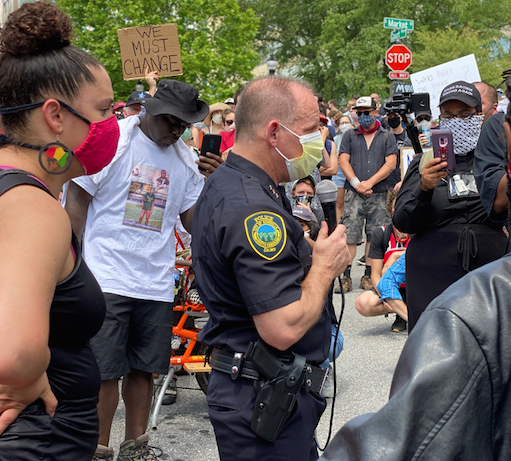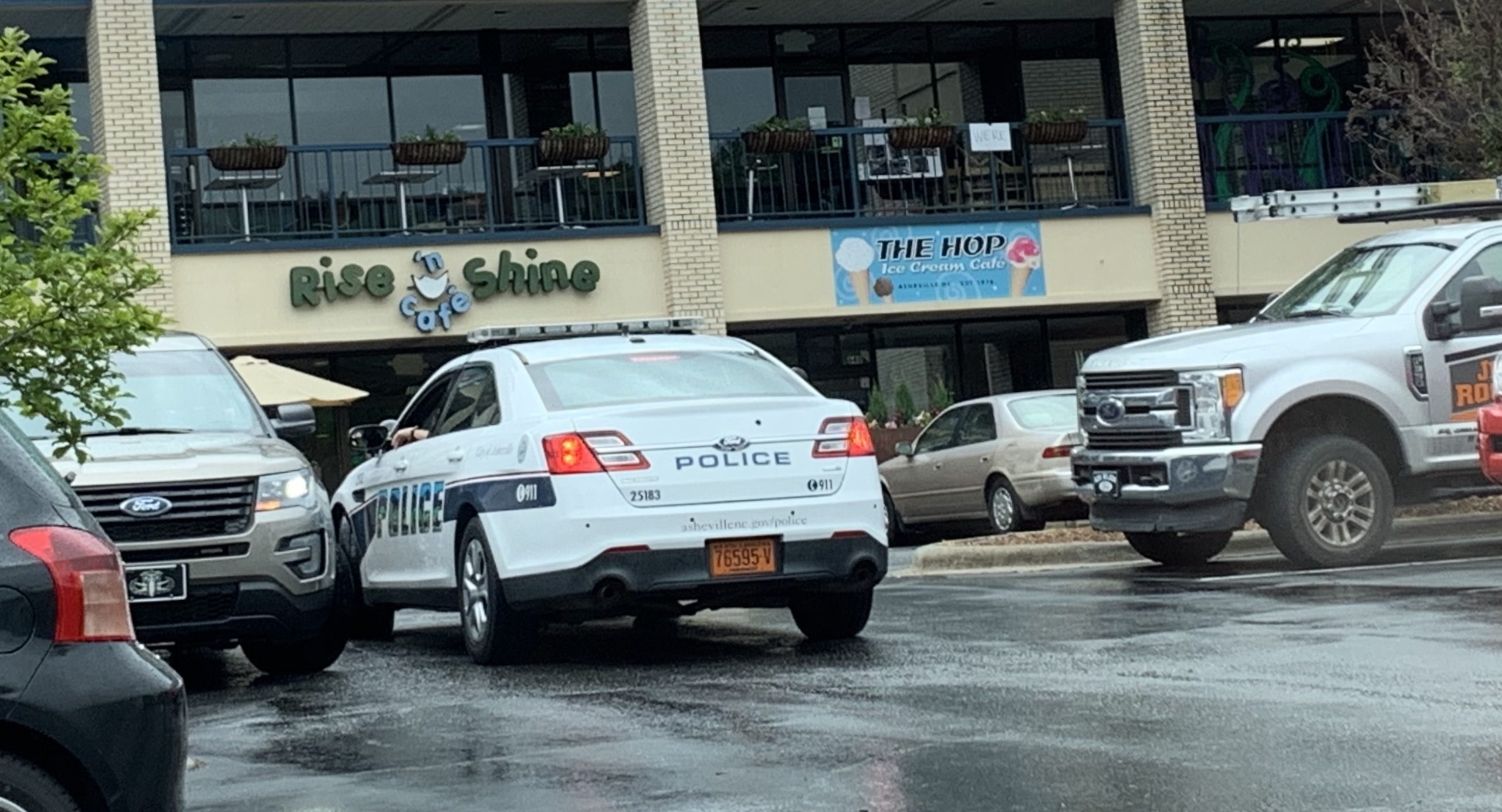Jason Sandford
Jason Sandford is a reporter, writer, blogger and photographer interested in all things Asheville.
By David Forbes
Late Friday the city of Asheville announced that after over a year of controversy and heated debates about his conduct, Asheville Police Department Chief William Anderson will retire at the end of the year.
The controversies, particularly intensifying over the past few months, have seen deep divides, with dissenting officers and critics of the department’s leadership blasting what they see as multiple issues with transparency and bad management. Meanwhile, Anderson’s had his defenders too, including some in the community and Asheville City Council, which asserted that long overdue reforms were finally underway (especially under a much-touted strategic plan) in a department that also lost a chief due to scandal in 2011.
Whoever succeeds Anderson will have their work cut out for them on one particularly thorny and so far under-discussed issue: pay.
Pay hasn’t received that much attention in the recent controversies, with most of the ink focussing on the department’s leadership, issues with staffing, surveillance, labor disputes and management.
But pay for public safety workers has been a source of serious controversy before. In 2012, after the recession years went by without a raise, the Fraternal Order of Police and the Asheville Firefighters Association rallied and demanded a higher raise than the one proposed by city staff, asserting that many of their members had trouble making ends meet as the cost of living in the area continued to rise while their wages remained stagnant. Council ended up passing a higher pay hike than originally proposed.
As the city has come out of the recession, regular increases have become more common, and the Council chambers haven’t seen a similar demonstration over pay since. But when the city does annual raises, rather than focusing on specific departments, it almost always opts to raise pay for everyone from city department heads (who make near or over six figures) to new firefighters and beat cops (who make a third or less of that) by the same percentage rate. The budget Council passed this summer gave all employees a 3 percent raise.
Salaries and wages for city employees already make up the majority of the city’s expenses, and this is an area where a push to pay employees well has also collided with the city’s revenue challenges and Council’s general reluctance to raise taxes, especially during the recession years. The last time the city did a comprehensive overhaul of its pay structure was in 2006, shortly after current City manager Gary Jackson took office.
Asheville City Council recently approved $200,000 for a similar study of compensation for all city staff, and the public will see the results in March. Tucked in the budget passed this summer is a note the city might shift to automatic annual pay hikes for all employees.
Short staffing has been raised as a problem in some of the recent police department controversies, with the department using a large amount of its overtime budget and having a shortage of dispatchers. The October petition signed by 44 officers cited a lack of manpower (“while HR is showing a vacancy of 10 sworn officers the number of officers on the road is significantly lower”) and forced overtime as some of its main concerns, but didn’t delve into pay directly.
One exception came in an anonymous letter sent to the city’s Civil Service Board in August and presented at its Sept. 4 meeting, where a discussion of the APD’s promotion policy was on the agenda. The letter, written as a report, analyzed the APD’s pay and compared it to other cities around the state and Asheville’s high costs of living. The writer asserted that officers needed better pay (specifically through a “step pay plan”), education incentives, take-home vehicles and longevity pay. These are policies the letter asserts are common throughout many other departments.
Letter to the Asheville Civil Service board
“Asheville costs more to live in than other major cities in North Carolina, thus the salary paid has less spending power,” the letter reads. “No other police officer working for a major city in North Carolina earns less spending power than an Asheville police officer.”
The writer hoped that the city would remedy the situation when it implements the new strategic plan and conducts “an in-depth review of these factors and subsequent policy changes may positively address issues that are negatively affecting the police department.”
Asked if city staff had received complaints about police pay, and how it’s dealt with those, spokesperson Dawa Hitch referred back to the ongoing compensation study.
“What I can say is that the city is engaged in this compensation and classification study now so we have a clear understanding of how we compare to other benchmarked cities and, most importantly, to the market,” Hitch says. “So I’m not comfortable making a statement about how different people do or don’t feel about how they’re paid. But I can tell you the city’s intention is to make strategic decisions based on good data and we want to be competitive in the market.”
This year’s city budget boosted spending on the APD from $22.6 to 24.2 million. The amount spent on salaries and wages rose too, from $12.8 to 13.4 million. The overall budget included $187,000 for smart phones for all officers. The city’s also spending $3 million to repair or replace the aging APD vehicle fleet while expanding the number of officers that get take-home vehicles, though the take-home vehicle plan hasn’t been implemented yet.
The plan calls for a review of compensation under its “recruitment and retention” goal, as well as how officers are classified and ranked, with any changes presented next year. Right now, if the plan’s going to plan amid all the shake-ups at the department, Deputy Chief Wade Wood is leading a group that’s interviewing officers who’ve left the department and comparing the pay and perks similar cities offer.
The letter criticizing the APD’s pay level is mistaken on a few factual grounds, whether one agrees with its overall criticism or not. Technically, the APD does have a “step pay plan,” meaning that officers are, on paper, periodically supposed to get a bump in pay even if they stay in the same rank, whether the city raises pay for all staff across the board or not. The plan has been on the books since the last time the city overhauled its pay scale in 2006.
Also, the department does have education incentives: police officers get a 5 percent pay increase if they qualify for “advanced certification,” which can be a combination of college courses as well as training. Officers with a bachelor’s or master’s degree, for example, can reach their advanced certification faster than those without. Also, all city employees receive reimbursement for their tuition if they pursue further education.
The letter is correct that the APD lacks longevity pay or a take-home vehicle program (though it’s in the process of implementing the latter as part of that much-vaunted strategic plan).
Here’s a look at the APD’s pay plan for the current fiscal year:
[portfolio_slideshow]
But here’s the kicker: in 2008 the plan was frozen, and it’s stayed that way ever since. Experienced officers who previously had ascended a few steps kept their higher pay, but new officers can’t advance up any of the pay steps.
Now, after a patrol officer, for example, reaches the first step, their pay will stay there except for cost-of-living increases or that advanced certification bonus. The city also froze merit pay across all departments during the recession. This was done, Hitch writes in an email, due to “the economy and associated budget challenges.”
As budgets, organization, and staffing can vary widely between different cities, it’s also worth comparing APD pay to that of the most similar local agency facing some of the same challenges (such as cost of living) in the area: the Buncombe County Sheriff’s Office. The two departments are somewhat differently organized, so there isn’t always an immediate, easy side-by-side comparison. Also, the city’s documents rate pay by rank, while the county’s rate it by job title or role. Instead of a step scale, county documents list a starting and maximum pay for each given position.
But while noting the differences between each organization, some comparisons are possible, and they show that even if the APD’s step pay plan were unfrozen, there would be some considerable differences.
At the Sheriff’s office, experienced rank-and-file officers can make considerably higher salaries, while at the APD the upper echelons have higher pay than their county counterparts. The result is that at the APD the gap between what the rank-and-file and the upper ranks bring in is considerably wider than at its sister agency. At the APD, the gap between an officer and a captain’s starting pay is $37,776. The gap between a Sheriff’s deputy and captain’s starting pay is $19,458 a year.
Starting pay for APD officers and Sheriff’s deputies — the biggest part of both forces — is fairly similar once they complete their training: $35,019 and $35,101 respectively.
Pay for the upper-middle echelons (lieutenants in the BCSO, sergeants and lieutenants in the APD) is also similar, with the APD a bit ahead: pay for an APD sergeant starts at $49,189, for a sheriff’s lieutenant at $47,765. The maximum pay also has the APD ahead: an experienced APD lieutenant can make up to $76,481, their counterpart at the BCSO brings in $73,061.
In pay for the top officers (those working just under the APD Chief and Sheriff), the APD comes out considerably ahead on pay. An APD Captain starts at $72,795 and can make as much as $90,995. A BCSO Captain, by contrast, starts out at $54,559 and can make up to $83,389.
However, in most rank-and-file roles, the Sheriff’s Office has a much higher ceiling for experienced employees. For example, even in the days when they were receiving experience and merit “step” increases, an APD officer’s pay maxed out at $43,744. By contrast, the ceiling for a deputy is $53,714.
While detectives aren’t specifically listed on the APD’s chart, according to the department they rank as Senior Police Officers. Again, starting pay is fairly similar: as a Senior Police Officer, an APD detective starts at $39,755 a year (plus a $900 annual clothing budget), while their counterpart at the sheriff’s office makes $40,091.
But a Senior Police Officer, even if they were eligible for the experience and merit increases they received pre-2008, would see their pay max out at $51,681, while an experienced sheriff’s detective can make as much as $61,290 a year.
Until this past year, the APD required 60 hours of college credit were required to become an officer, but has now reduced its education requirements to a GED or high school diploma, though preference is given to applicants with military service or advanced degrees. The APD also requires officers to complete the basic law enforcement training curriculum, as does the Sheriff’s Office.
Why did that requirement change?
“To recruit more military service members who may have forgone the formal secondary education route, but still recognizes the life experience and training afforded these men and women,” APD spokesperson Sgt. Dave Romick writes. “This also aligns us with benchmarked cities throughout the region with similar requirements.”
Hitch asserts that the city is aware it’s been some time since pay not just for police officers but all city employees has seen a comprehensive overhaul, but that such a process isn’t necessarily easy or quick and all involved should be patient.
“Council has been very encouraging about taking a serious look at our compensation,” she says. “I think we’ve got to let the professionals do the work they need to do.”
David Forbes is a local journalist and editor of the Asheville Blade, a reader-supported site for sharp news and views.

























I like the fact that the APD cut requirements and should do so to the state minimums and challenge those, and should absolutely recruit “social workers and community activists” and in particular, domestic violence volunteer councillors out of Helpmate. Many of whom make under $16/hour I bet.
Holly Jones announced Saturday that Chief Anderson is exceptional at domestic violence enforcement.
This explains a great deal as domestic violence enforcement is hard, dangerous, demoralizing, frustrating police work, which could easily involve forced overtime and make it hard to cover shifts. It is also more important than releasing the Moral Monday surveillance video, so we may have to rush to Anderson’s defense before the video is released. I only hope Holly is not too late.
If Holly is too late, then I nominate April Burgess-Johnson of Helpmate to replace Anderson as Asheville Police Chief.
I would love to see how your “social worker” cops respond when a deranged shooter rampages through Asheville. We have been lucky so far, but it is only a matter of time. Touchy-feely has its’ places, but behind a badge on the mean streets is not one of them. Our streets are getting meaner every time I walk them. I want cops to be more bad-ass than candy-ass.
Let’s not base social policy on extreme, unlikely and rare events like a ‘rampaging deranged shooter’. Let’s base it on real, every day concerns and dangers. Poverty, class divide, racism, domestic violence, mental illness, homeless rates. An ability to understand nuances and human behavior is far more useful than you are giving it credit for.
I’m all for tough hard liners in rough places, but Asheville’s streets are not mean. They are full of boring tourists, underpaid cops, over paid hotel barons, and transients.
“To recruit more military service members who may have forgone the formal secondary education route, but still recognizes the life experience and training afforded these men and women,”
It can be hard for veterans to get work, and I’m all for broader opportunities for those leaving military service, but I’m not convinced by the prospect of staffing up police departments (and prisons) with people who’ve honed their people skills in Iraq and Afghanistan, especially when PDs are loading up on surplus military kit.
Your pathetic Clintonesque loathing for the military aside, the main reason that police departments want veterans is not their combat training, but their shared experience in uniformed services with very similar disciplinary structures.
I am sure you would rather staff APD with social workers and community activists. No wonder so many vagrants and potheads are taking over downtown. I wonder what will happen to Ashville’s tourist income when word gets out that APD cannot protect people or property here because it cannot get out from under the thumb of whiny aging hippies.
You could not pay me enough to be a cop here. Let’s not forget that even with Anderson’s departure, the rumored work culture at APD was that most officers above the rank of Captain AGREED with Anderson’s corrupt and tyrannical policies, and they will still be in APD after Anderson is gone.
Your pathetic Clintonesque loathing for the military aside
Oh, kick that strawman, Big Al! Kick it hard! See if you can wave an eagle and stick a flag in your rear while you’re doing it.
their shared experience in uniformed services with very similar disciplinary structures.
Except they’re not.
I am sure you would rather staff APD with social workers and community activists.
Keep kicking that strawman! It’ll be dead soon! Maybe I want APD staffed with cops trained to be cops, following broad principles set down a long time ago.
http://en.wikipedia.org/wiki/Peelian_Principles
The police are the public; the public are the police.
You see far too many cops now describe themselves as “troops” and adopt the language and attitude of military occupation. Plenty of them are just wannabe warriors kitted out in military surplus. Some of them have brought the war home with them.
But hey, if the thought of MRAP patrols around the PJs gives you a warm feeling in your nethers, who are we to argue?
Blithering idiot, my guess is your sorry hippie a$$ wouldn’t have the guts to repeat that to a veteran of either of those two wars. I’d love to be a bystander if you did. You really are a POS.
Oh, there are two of you with plastic eagles on your shoulders and flags stuck up your asses, whacking away at straw men?
Maybe show up at a PTSD clinic at the VA some time.
Too many cops already think of themselves as armies of occupation, even though they’ve never seen a day in combat. It doesn’t help when they get shipped a bunch of military surplus kit. Throw in the wrong kind of ex-military — yes, there are some who’ve fought overseas who shouldn’t be pointing guns at American civilians, and it’s BS to say otherwise — and you have a recipe for trouble.
It’s very easy to be full of rah-rah-go-military platitudes, but the legacy of 15 years of hot war is thousands of people who’ll end up on the wrong side of the law, and no chickenhawk is going to prove me wrong about that. War is a gift that keeps giving long after the fighting stops, in broken homes, broken marriages, broken bones or blown-out brains.
I think it makes sense to translate military service Ito police service. Lutherrs concerns are valid, and real, but the solution to those concerns is not to avoid this obvious streamlining of social infrastructure.
“asserting that many of their members had trouble making ends meet as the cost of living in the area continued to rise while their wages remained stagnant.”
-That’s almost everybody in this town who works for hourly wages, actually. The problem is huge- and not just the PD. It’s a problem with area employers knowing they can get away with it including the city.